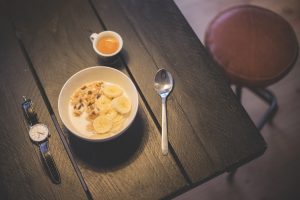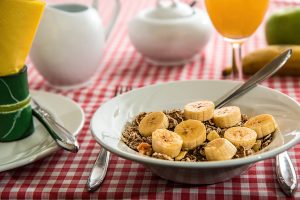 I don’t have time, I’m not hungry in the morning and I’m on a diet are three common excuses for missing breakfast. Unfortunately, athletes who skip breakfast generally suffer needless fatigue. They tend to have trouble concentrating later in the morning, and they work or study less efficiently. They can easily overeat at night and gain undesired body fat. Clearly, breakfast is a very important meal of the day!
I don’t have time, I’m not hungry in the morning and I’m on a diet are three common excuses for missing breakfast. Unfortunately, athletes who skip breakfast generally suffer needless fatigue. They tend to have trouble concentrating later in the morning, and they work or study less efficiently. They can easily overeat at night and gain undesired body fat. Clearly, breakfast is a very important meal of the day!
If you are a breakfast skipper and routinely miss this energizing meal, try this experiment: Eat breakfast for three consecutive days and observe the benefits: more energy, less hunger, better nutrition. You’ll quickly discover breakfast is a key meal for champions!
Here are solutions to some breakfast barriers:
I don’t have time
You really do have time to do what you want to do. If you can make time to exercise, you can also make time to enhance your exercise program by appropriately fueling your muscles. You’ll discover:
- you can think, work, and recover better if you eat breakfast within an hour of your morning workout.
- you’ll have much more energy during an afternoon workout if you have eaten a substantial breakfast.
If you won’t eat breakfast at home, then simply eat breakfast on the run: a bagful of raisins and granola at the bus stop, a bagel with peanut butter on the way to school, or a yogurt and almonds at work. You don’t have to eat breakfast immediately upon getting out of bed. Your morning break can be more than just coffee!
I’m not hungry in the morning
Most often, athletes who lack a morning appetite ate their breakfast at bedtime, the night before. Too many evening snacks can easily ruin your morning appetite and also contribute to weight gain (if you overeat), dietary deficiencies (if you displace healthful breakfasts with “junk food” for snacks) and muscle fatigue (if you eat high-fat evening snacks—such as chips, chicken wings, ice cream—that inadequately refuel your muscles). Plan to rearrange your meal pattern so you eat a heartier breakfast, fewer evening snacks—and wake up hungry.
I’m on a diet
The most successful diets start with a substantial breakfast and end with a lighter dinner. A wholesome, carb-protein breakfast both fuels and builds your muscles and also prevents you from getting too hungry. When too hungry, you are less likely to care about what you eat and more likely to indulge in sweets and treats. Research suggests athletes who under-eat during the day have more body fat than those who eat adequately during their waking hours. Remember: You are going to eat the calories eventually; you might as well enjoy them in the morning in the form of quality food that keeps you feeling well-fed.
What’s best to eat?
Any breakfast is better than no breakfast, but some choices are better than others for your sports diet. You can easily boost your energy with some of these breakfast foods that fuel your muscles and your brain: oatmeal, whole grain cereal, whole-grain waffles, French toast, bagel, English muffin, banana bread, grits, fruit, juice, or whatever carbohydrate-based foods that might be readily available. Add some protein to build and repair muscles: eggs, cottage cheese, yogurt, cheese, nuts, and peanut butter.
 One quick and easy “breakfast of champions” is iron-enriched cereal with lowfat milk, banana, and orange juice. This simple meal provides important nutrients that support your athletic program:
One quick and easy “breakfast of champions” is iron-enriched cereal with lowfat milk, banana, and orange juice. This simple meal provides important nutrients that support your athletic program:
- Carbohydrates: the best source of muscle fuel. Carbs should be the foundation of every sports-meal. A breakfast with whole-grain cereal, milk, fruit, and juice is an easy way to help meet that goal!
- Iron: a mineral important for carrying oxygen from the lungs to your working muscles. An iron-rich diet reduces your risk of becoming anemic and experiencing needless fatigue during exercise. By enjoying orange juice along with iron-enriched cereals, you can absorb more iron. Note: the “all natural” cereals such as granola or Kashi, have no additives, hence no iron added. Combine them with enriched brands.
- Calcium: from milk or yogurt eaten with the cereal. Calcium is important for strong bones, as well as for helping muscles contract properly.
- Potassium: a mineral (electrolyte) lost in sweat. Bananas, OJ, whole grain cereals are potassium-rich.
- Fiber: to promote regular bowel movements and reduce the risk of unwanted pit stops during exercise. If plagued by constipation, select raisin bran, bran flakes, All-Bran, or any type of bran cereal. If diarrhea is a problem, reduce fiber intake!
Summary
A carbohydrate-based breakfast that also includes some protein is a critical energy booster that helps athletes fuel and repair their muscles. Without this morning meal, you are likely to run on fumes, perform less effectively, and reduce your intake of nutrients that contribute to health and top performance. Try these meals for a high energy day:
- Bran cereal, banana, chopped almonds, and lowfat milk.
- Whole wheat bagel with peanut butter, and a latte.
- French toast, ham, orange juice, and Greek yogurt.
- Greek yogurt with granola, almonds, and berries.
Reprinted with permission from Nancy Clark.
Nancy Clark, MS, RD, CSSD (Board Certified Specialist in Sports Dietetics) counsels both casual and competitive athletes at her office in Newton, MA (617-795-1875). Her best selling Sports Nutrition Guidebook and food guides for marathoners, cyclists and soccer players offer additional information. They are available at www.NancyClarkRD.com. For her popular online workshop, see www.NutritionSportsExerciseCEUs.com.

